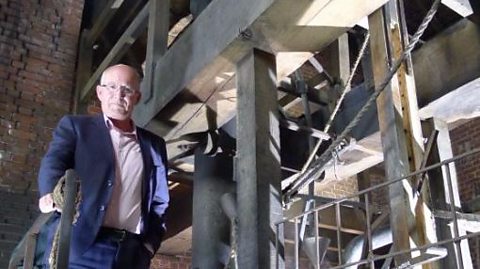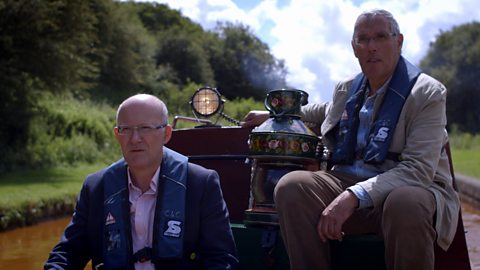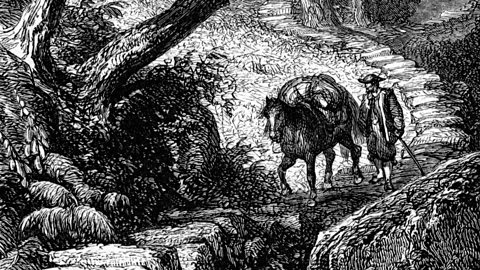PROFESSOR JEREMY BLACK:'The Industrial Revolution lead to the invention of the factory and powered a huge growth in industrial towns. Completely changing Britain's landscape and the way that people lived and worked. No longer were men, women and children 'producing goods piecemeal in their homes. From now on they toiled on production lines'
PROFESSOR JEREMY BLACK:'in great cathedrals of labour. The lives of workers were transformed for generations to come. Sally Hoban is a historian of the city of Birmingham.' So I've got here a painting of the manufactory works at Soho. Would you describe this as sort of one of the first factories?
SALLY HOBAN:I would, absolutely. It's a large building. It would have been a hive of enterprise. Thousands of workers - men, women and children working in all those different rooms in the factory. And if you can imagine, as well, the noise and the industry in the place, very much like you can hear in the background here -
SALLY HOBAN:it must have been a fantastic place. I would definitely say that Soho was one of the very, very first factories in the world.
PROFESSOR JEREMY BLACK:It's sort of the idea, we take the factory for granted but it actually starts in a specific place, in a specific period.
SALLY HOBAN:It does.
PROFESSOR JEREMY BLACK:The making of the modern world.
SALLY HOBAN:The making of the modern world.
PROFESSOR JEREMY BLACK:'Now the great and the good made enlightenment tours Not just to London, Paris and Rome⦠but also to Birmingham. They came to see, and learn, how the town's entrepreneurs were producing a wider range of goods more cheaply than ever before. Mr Harvey sold the finest swords'
PROFESSOR JEREMY BLACK:'Mr Harris boasted of telescopal or portable toasting forks. The famous Mr. Taylor was using the latest steam powered machinery To manufacture tortoise shell and mother of pearl buttons for the leaders of society. Of all the treasures manufactured here, it's these delicate little objects'
PROFESSOR JEREMY BLACK:'which really capture my imagination.'
SALLY HOBAN:In the late 18th century, Birmingham was most noted for objects such as this, that we call Birmingham toys. And by that we don't mean the cuddly variety, we mean articles usually made of metal used for personal adornment, so to be carried about the person. This is absolutely exquisite - this little fish here, you see?
PROFESSOR JEREMY BLACK:Oh yes.
SALLY HOBAN:Really rather wonderful. It's called a vinaigrette. And how it works, is that if you're an 18th century gentleman and you were at a business dinner, or doing some business outside the home and you were sitting next to somebody who perhaps didn't smell very nice.
PROFESSOR JEREMY BLACK:Oh right, didn't clean their teethβ¦
SALLY HOBAN:Didn't really clean in the 18th Century. You would pull this out of your pocket and when they weren't looking open up the top. So can you see that there's a perforated layer in there?
PROFESSOR JEREMY BLACK:Oh yes, yes. Lots of holes thereβ¦
SALLY HOBAN:Well inside there would have been some sponge soaked in orange oil, so you could very carefully have⦠Had a little sniff and then quickly put the top back on and put it back in your pocket before they notice. And literally thousands and thousands of those were made.
PROFESSOR JEREMY BLACK:'In the century from 1700, Birmingham's population exploded. turning from a small metal working town of 7000 people to a city nine times the size - the third largest in the Kingdom after London and Bristol. A change fuelled by the transformative power of the Industrial Revolution.'
Video summary
Today we take factories for granted but in the 1700s they represented a completely new way of working.
Until this time most work was done in the home or in small workshops. Birminghamβs metal trades saw the development of new factories like the one at Soho.
Birmingham began to pour out metal goods which its merchants traded around the world β weapons, tools, household goods.
Birminghamβs factories were also producing toys and trinkets like polished buttons or brooches.
In the course of the 1700s Birmingham rose from a small town of about 7000 people to the third largest city in the country in 1800, and it would continue to grow.
This short film is from the ΒιΆΉΤΌΕΔ series, Why the Industrial Revolution Happened Here.
Teacher Notes
This short film could be used to provide an overview of Birmingham's development as an industrial centre, and as a prelude to an in-depth study of a key individual figure, such as the manufacturer and businessman Mathew Boulton.
You could challenge your students to design an advertisement for Birmingham Council which aims to encourage businessmen to set up new factories in Birmingham.
Explain how the town is already a hotbed of industry and why this would be a good place to build a new industry.
This short film is suitable for teaching history at Key Stage 3 and GCSE, Third Level and National 4 & 5, in particular units on the Victorians and the Industrial Revolution.
Josiah Wedgwood: Genius of the Industrial Revolution. video
Professor Jeremy Black explores Josiah Wedgwood's innovative ways of marketing and advertising his pottery, including opening the first ever showroom.

The brains behind the Industrial Revolution. video
Professor Jeremy Black shows how, at the birth of the Industrial Revolution, Britain's political and economic climate allowed inventive minds to blossom.

The importance of coal in the Industrial Revolution. video
Professor Jeremy Black digs deeper into our industrial past and finds that Britain sat on top of bountiful coal deposits, perfect to power newly-invented steam engines.

The transport revolution: Britain's canal network. video
Canals were the motorways of the 1700s, says Professor Jeremy Black. Building them took huge amounts of money and some incredible feats of engineering.

Why did Britain need a better road network? video
Professor Jeremy Black explains how the state of Britain's roads in the early 1700s was holding back the Industrial Revolution, and how business owners changed all that.
